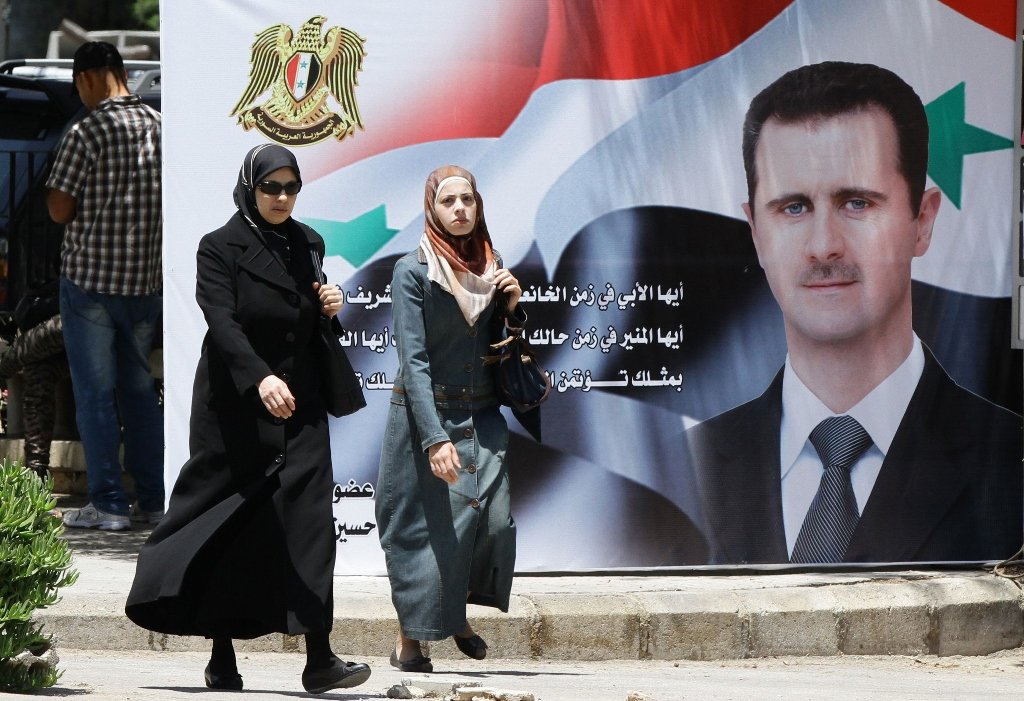
Voting began at 7 am in 9,000 voting offices open only in areas under regime control, for an election boycotted by the opposition and which experts say will only prolong a brutal war that has ravaged the country for three years.
People queued outside voting offices in Damascus, where billboards and posters glorify the head of state.
In Baghdad Street in downtown Damascus, 40-year-old Nadia Hazim cast her vote at the Bassel al-Assad school. She told AFP that she would "vote for the president (Assad), naturally".
In the hall, a transparent ballot box could be seen, as well as a voting booth behind a white curtain.
Photographs of Assad as well as two virtually unknown candidates had also been put up in the voting office.
Voters were searched on entry, as the election comes a day after a truck bomb attack in Homs that killed 10 people, and that compounded fears that regime-held areas might come under rebel attack on voting day.
Opposition chief Ahmad Jarba has called on Syrians to "stay home", while opposition activists who launched a March 2011 Arab Spring-inspired revolt against Assad have branded the vote a "blood election".
The interior ministry says more than 15 million Syrians have been called to participate in what is theoretically the country's first election in some 50 years, with Assad and his father Hafez renewing their mandates in successive referendums.
It takes place as a savage war rages, with the air force bombarding rebel areas in Aleppo and fierce fighting in Hama, Damascus, Idlib and Daraa.
Observers from countries allied to the regime - North Korea, Iran and Russia - are supervising the voting, while regime media says a security plan has been put in place to prevent possible attacks against voters and polling stations.
Assad faces two virtually unknown competitors - Maher al-Hajjad and Hassan al-Nuri - while the head of state is glorified in huge posters and billboards set up across territory under regime control.
The Assad clan has ruled Syria with an iron fist for more than 40 years. All dissent has been systematically crushed throughout that time, with Assad's father Hafez notoriously ending a Muslim Brotherhood-led rebellion in Hama in the 1980s, and tens of thousands of people still languishing in jails.
Nuri, who studied in the United States, told AFP he expects to come second after Assad.
Both he and Hajjar have issued only light criticism of Assad's rule, for fear of being linked to an opposition branded "terrorist" by the regime, focusing instead on corruption and economic policy.
For Noah Bonsey, a senior Syria analyst with the International Crisis Group, the regime is using the election "as part of a broader narrative portraying its eventual victory as inevitable".
The war has destroyed large swathes of the country and forced nearly half the population to flee their homes.
A Syrian monitoring group says 2,000 people, including hundreds of children, have been killed since January in a massive aerial offensive on Aleppo in the north, as the regime tries to retake the country's second city after its advances in Homs, and Qalamun near Damascus.
"The regime can only gain ground after reducing it to rubble, and can only hold it insofar as it remains empty of its original inhabitants," said Bonsey.
"This was the regime's approach before the election and it remains so after it; it leads to continued war, not victory."
But Waddah Abed Rabbo, chief editor of pro-regime newspaper al Watan, argued that the election could facilitate the resumption of peace talks, after negotiations in Switzerland earlier this year ended in a stalemate.
"In Geneva, the opposition made its rejection of Assad running in the presidential election a priority at the talks. Assad was a red line that blocked everything," Abed Rabbo said.
"Now that he will be voted back in by a majority, there will be no objection by the authorities to discuss other issues."
1731570357-0/elon-musk-(1)1731570357-0-405x300.webp)
-(1)1717678110-0/Kendrick-(1)-(1)1717678110-0-165x106.webp)





1732445375-0/Untitled-design-(9)1732445375-0-270x192.webp)


1732428810-0/Copy-of-Untitled-(3)1732428810-0-270x192.webp)






COMMENTS
Comments are moderated and generally will be posted if they are on-topic and not abusive.
For more information, please see our Comments FAQ